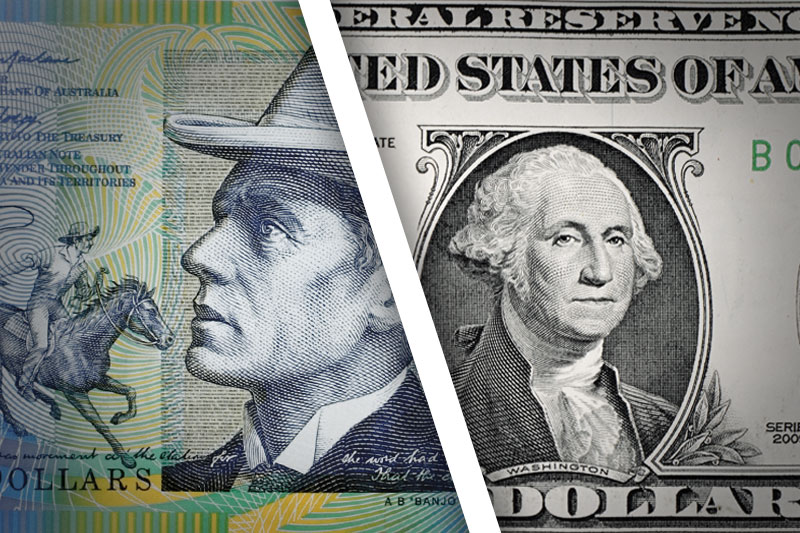Investing.com- The Australian dollar was seen backing off of three-month highs against its U.S. rival in Monday’s Asian session as investors continue to fret over the U.S. fiscal cliff.
In Asian trading Monday, AUD/USD was off 0.27% at 1.0539. The pair touched 1.0584 on Wednesday, the pair’s highest since September 14; the pair subsequently consolidated at 1.0564 by close of trade Friday, up 0.78% for the week.
AUD/USD is likely to find support at 1.0509, Friday’s low and short-term resistance at 1.0584, Wednesday’s high.
As one of the so-called riskier currencies, the Aussie dollar usually benefits from good economic data from the world’s largest economies and AUD/USD did get that benefit last week.
In U.S. economic news delivered Friday, the Federal Reserve said industrial production jumped 1.1% last month following a 0.7% decline in November. The November increase is the best since December 2010.
The Labor Department said the consumer price index fell 0.3% last month. The core index, which excludes food and gas prices, rose 0.1%.
During Friday’s Asian session, HSBC’s initial reading of China’s purchasing managers index for December showed a reading of 50.9. That topped economists’ expectations calling for a reading of 50.9 and indicates the world’s second-largest economy is in turnaround mode. The U.S. and China are the world’s two largest oil-consuming nations.
However, fears over the fiscal cliff are seen weighing on riskier assets in Monday’s Asian session. Talks between President Obama, a Democrat, and House Speaker John Boehner, a Republican, continue. However, no resolution appears to be forthcoming. There is one sliver of hope though, as Boehner, previously against tax increases of any kind, has shown a willingness to let the tax rate rise on U.S. taxpayers earning more than $1 million per year.
The current top tax rate is 35%, which if expired, would head to 39.6%. The Obama Administration wants the top tax rate to rise for those U.S. households with $250,000 or more in annual income.
Elsewhere, AUD/JPY jumped 0.36% to 88.58 following Japan’s election results while AUD/NZD added 0.03% to 1.2493. EUR/AUD climbed 0.21% to 1.2185 while GBP/AUD jumped 0.2% to 1.5341.
In Asian trading Monday, AUD/USD was off 0.27% at 1.0539. The pair touched 1.0584 on Wednesday, the pair’s highest since September 14; the pair subsequently consolidated at 1.0564 by close of trade Friday, up 0.78% for the week.
AUD/USD is likely to find support at 1.0509, Friday’s low and short-term resistance at 1.0584, Wednesday’s high.
As one of the so-called riskier currencies, the Aussie dollar usually benefits from good economic data from the world’s largest economies and AUD/USD did get that benefit last week.
In U.S. economic news delivered Friday, the Federal Reserve said industrial production jumped 1.1% last month following a 0.7% decline in November. The November increase is the best since December 2010.
The Labor Department said the consumer price index fell 0.3% last month. The core index, which excludes food and gas prices, rose 0.1%.
During Friday’s Asian session, HSBC’s initial reading of China’s purchasing managers index for December showed a reading of 50.9. That topped economists’ expectations calling for a reading of 50.9 and indicates the world’s second-largest economy is in turnaround mode. The U.S. and China are the world’s two largest oil-consuming nations.
However, fears over the fiscal cliff are seen weighing on riskier assets in Monday’s Asian session. Talks between President Obama, a Democrat, and House Speaker John Boehner, a Republican, continue. However, no resolution appears to be forthcoming. There is one sliver of hope though, as Boehner, previously against tax increases of any kind, has shown a willingness to let the tax rate rise on U.S. taxpayers earning more than $1 million per year.
The current top tax rate is 35%, which if expired, would head to 39.6%. The Obama Administration wants the top tax rate to rise for those U.S. households with $250,000 or more in annual income.
Elsewhere, AUD/JPY jumped 0.36% to 88.58 following Japan’s election results while AUD/NZD added 0.03% to 1.2493. EUR/AUD climbed 0.21% to 1.2185 while GBP/AUD jumped 0.2% to 1.5341.
